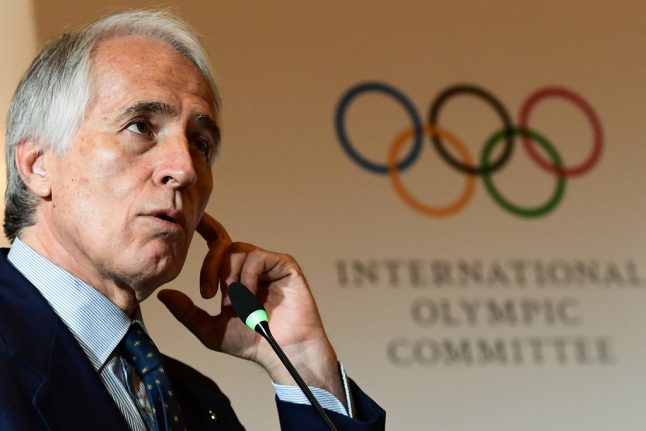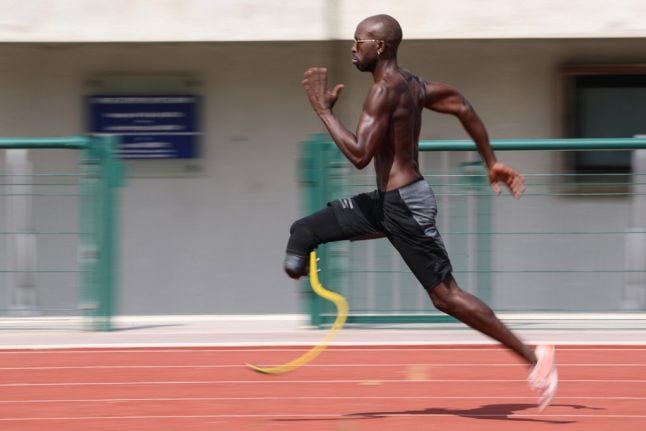OLYMPICS
Polls show Italians much more enthusiastic about 2026 Winter Games bid than Swedes
Support for Italy's bid to host the 2026 Winter Olympics in Milan and Cortina d'Ampezzo has grown with 83 percent of Italians now backing the project, according to poll carried out by the International Olympic Committee (IOC).
Published: 6 April 2019 16:21 CEST

President of the Italian National Olympic Committee Giovanni Malago speaks during a visit of the IOC Evaluation Commission for the 2026 Winter Olympics games on Saturday. Photo: Miguel MEDINA / AFP
By comparison, similar polls carried out in Sweden, where Stockholm is the only city in competition with Italy, put the figure at 53 percent.
IOC evaluation commission chairman Octavian Morariu revealed the Italian poll figures on Saturday after an inspection of proposed sites in the country's northern regions of Lombardy and Veneto.
Morariu described the joint bid by Italy's financial capital and Dolomites ski resort Cortina D'Ampezzo as a “very competitive proposition”.
“After our five days here, we can say that the overwhelming popular support demonstrated by the latest IOC poll is not a surprise,” Morariu told a press conference.
In Milan, 87 percent are in favour of the Olympics, while in the region of Lombardy, of which Milan is the capital, it was 81 percent and Cortina's Veneto region, 80 percent.
“Wherever we went we felt welcome,” continued Morariu of the visit which began in Venice.
Under the bid, figure skating, hockey and short-track speedskating would be held in Milan, with sliding sports and curling in Cortina; and speedskating, biathlon and Nordic sports would take place at Trentino-Alto Adige. The alpine skiing events would be in Bormio for the men and Cortina for women while the opening ceremony would be at the San Siro football stadium, with the closing ceremony at Verona's Arena, a large Roman amphitheatre.
“We found a great candidature team, that put a lot of passion and enthusiasm into the work,” said Morariu. “This is really very, very strong.”
'Financial boost' –
Despite darkening clouds gathering over Italy's economy, the Italian government on Friday officially provided the financial guarantees for the bid amounting to €415 million ($465 million).
“There's strong support from the government, local communities, athletes and the financial community,” said Morariu. “The letter we received yesterday from the government proved it.”
Former Romanian rugby international Morariu said the IOC would invest a further $920 million into the project.
“The Olympic Games are a catalyst for social and environmental change and also a true business opportunity,” he said.
Milan mayor Giuseppe Sala said local people overwhelmingly backed the project.
“We want to win!” said Sala. “The Olympic Games could provide a fundamental opportunity for our city.”
No formal backing in Sweden
Stockholm has yet to receive full backing from the Swedish government with the deadline for providing guarantees officially April 12.
“What matters is that we receive the guarantees in due time, have time to analyse them and have them approved by the committee by June 24,” said Morariu referring to the date when the winning bid will be chosen in Lausanne. “This is the date that matters.”
Italian Olympic Committee (CONI) president Giovanni Malago said they hoped that their “track record” would convince the IOC to choose them over Sweden.
“Italy has a long history of organising great sports events. We hope this tradition can continue in 2026,” added Malago.
Italy has hosted the Olympic three times, with the 1956 and 2006 Winter Games held in Cortina and Turin respectively, and Rome hosting the 1960 Summer Games.
Url copied to clipboard!




 Please whitelist us to continue reading.
Please whitelist us to continue reading.
Member comments